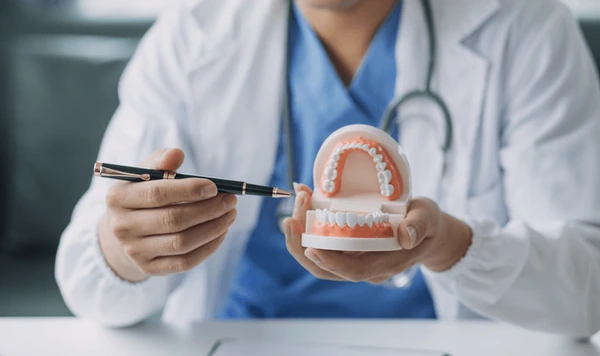
What Are The Long-term Health Concerns Of Having Dental Implants?
Dental implants are a popular and effective solution for replacing missing teeth, offering both functional and aesthetic benefits. While dental implants have a high success rate and are generally considered safe, it’s natural to wonder about the potential long-term health concerns associated with this procedure. For expert care, visit our Dental Implants Treatment in Pragathi Nagarto address any concerns and ensure a healthy, lasting smile. Understanding these concerns can help patients make informed decisions and maintain their oral health after getting implants.
1. Peri-Implantitis: The Major Concern
One of the most common long-term risks of dental implants is peri-implantitis, a condition characterized by inflammation around the implant. Best Dentist in Pragathi Nagar for expert advice and care.
Causes: Poor oral hygiene, smoking, diabetes, and a history of gum disease can increase the risk of peri-implantitis.
Symptoms: Swelling, bleeding gums, discomfort around the implant, and, in advanced cases, loosening of the implant.
Prevention: Regular dental check-ups, meticulous oral hygiene, and avoiding tobacco products are key to reducing the risk.


2. Implant Failure Due to Bone Loss
Dental implants rely on a stable and healthy jawbone for support. Over time, insufficient bone density or volume may lead to implant instability or failure. At ourBest Dental Clinic in Hyderabad, we assess your bone health and recommend treatments to ensure successful and lasting implants. Our experts provide personalized care, addressing potential risks to maintain implant stability and your overall oral health.
Causes: Osteoporosis, untreated peri-implantitis, or excessive pressure on the implant from grinding or clenching (bruxism).
Prevention: Patients with low bone density may require bone grafting before implant placement. Wearing a nightguard can help manage bruxism.
3. Nerve Damage
Improper placement of a Dental Implants in Pragathi Nagar can sometimes result in nerve damage, particularly in the lower jaw.
Symptoms: Numbness, tingling, or pain in the gums, lips, chin, or tongue.
Prevention: Choosing an experienced dental surgeon and using advanced imaging techniques like 3D scans can minimize this risk.


4. Sinus Problems
For implants placed in the upper jaw, particularly near the sinus cavity, there is a potential risk of sinus perforation.
Causes: Implants extending into the sinus cavity due to improper placement.
Prevention: Pre-surgical planning, including sinus lift procedures, can help ensure there is adequate bone support for the implant.
5. Allergic Reactions
Though rare, some individuals may experience an allergic reaction to the materials used in dental implants, such as titanium.
Symptoms: Swelling, loss of taste, and chronic discomfort.
Prevention: Discussing any metal allergies with your dentist before the procedure can help identify alternatives like zirconia implants.


6. Systemic Health Implications
For individuals with chronic health conditions, dental implants may present additional concerns.
Diabetes Patients with poorly controlled diabetes are at a higher risk of infection and slower healing.
Autoimmune Diseases: Conditions like rheumatoid arthritis or lupus may affect the healing process and the long-term stability of implants.
Prevention: Comprehensive pre-surgical evaluation and ongoing communication with your dentist can help manage these risks.
7. Wear and Tear on Adjacent Teeth
Improperly placed implants or crowns can lead to excessive pressure on adjacent teeth, causing wear or damage over time. Our Dental Hospital in Pragathi Nagar ensures precise implant placement and customized treatment plans to prevent such issues. Trust our experienced team for optimal dental care, maintaining your oral health for the long term.
Prevention: Ensuring precise placement and alignment of implants is crucial. Regular follow-ups can help detect and address any issues early.



8. Maintenance Challenges
While dental implants do not decay like natural teeth, they still require maintenance to prevent complications.
Concerns: Bacteria can accumulate around the implant, leading to gum disease or other infections.
Prevention: Regular brushing, flossing, and professional cleanings are essential to maintain the health of the surrounding tissue.
Tips for Long-term Success with Dental Implants
1. Choose an Experienced Dentist: Ensure your dental surgeon has expertise in implantology and uses advanced technology.
2. Maintain Excellent Oral Hygiene:Brush and floss daily to keep the area around the implant clean.
3. Schedule Regular Check-ups:Visit your dentist regularly to monitor the condition of your implants and overall oral health.
4. Address Health Conditions:Manage chronic health issues, such as diabetes or bruxism, that could impact implant longevity.
5. Avoid Harmful Habits: Quit smoking and limit alcohol consumption to promote healing and reduce the risk of complications.



Frequently Asked Questions
Frequently Asked Questions
Yes, dental implants are considered a safe and effective solution for replacing missing teeth. When properly cared for, they can last a lifetime without significant health risks.

